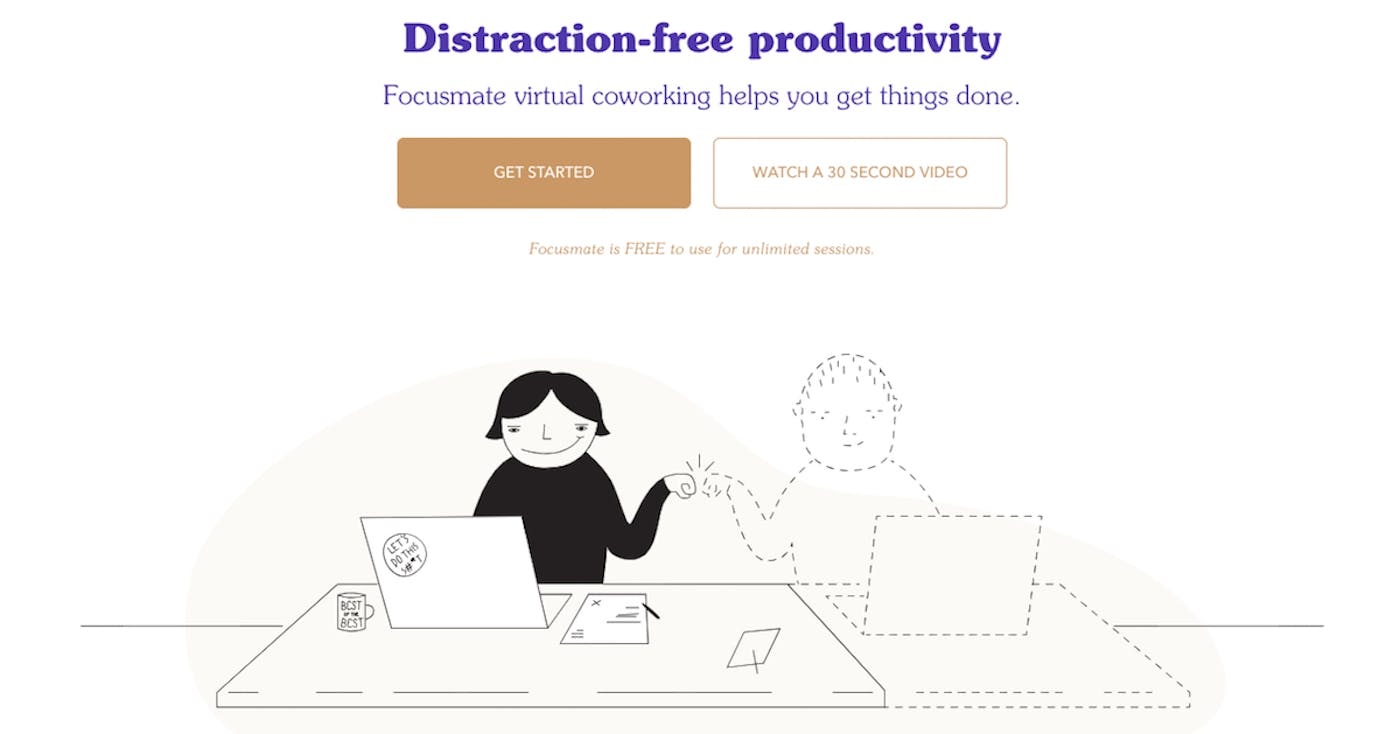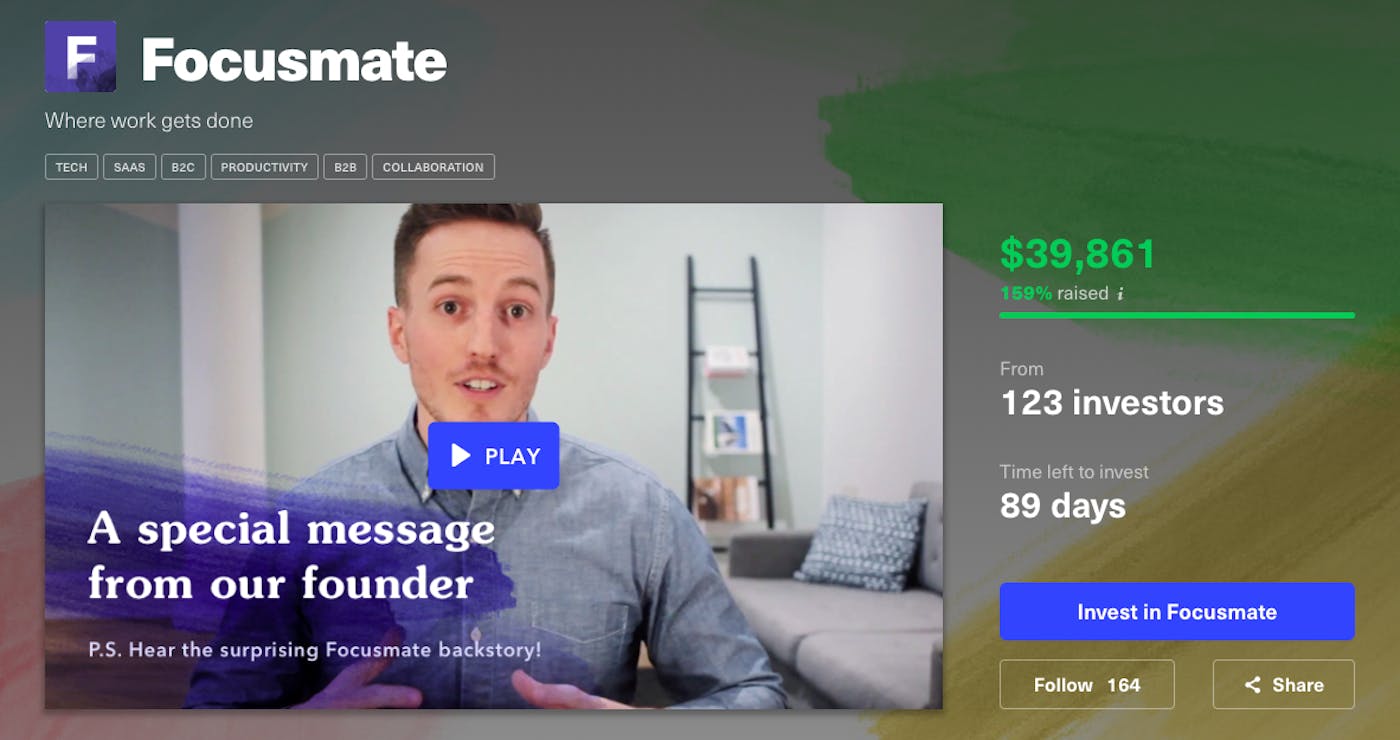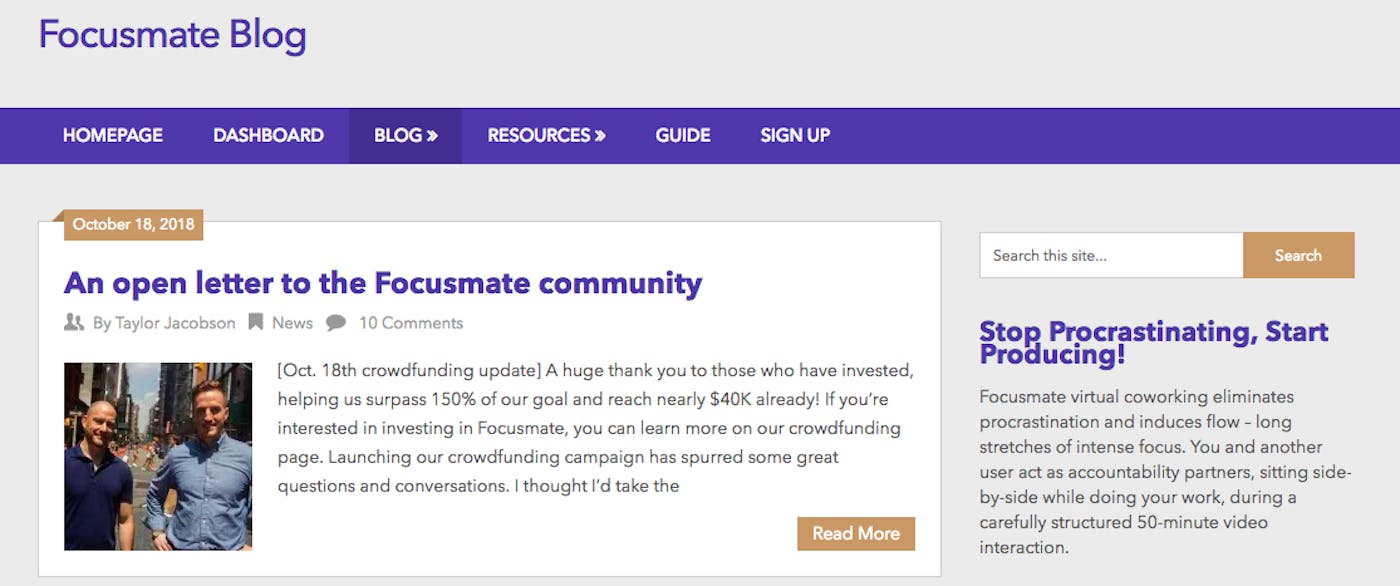Using My Biggest Struggle as the Launchpad for a Successful
Business
Hello! What's your background, and what are you working on?
I'm Taylor Jacobson, founder of Focusmate.
I spent a fair portion of 2011 in a shame spiral after almost getting fired because of procrastination. I dug my way out by studying self-improvement — behavioral science, productivity, spirituality — and realizing that I could use my crucible to help others.
It took a bit of time to figure out the best approach, but I eventually got trained as an executive coach and built a freelance business working with clients like Yale, Wharton, and Cornell. These clients gave me a nice real-world data set on what other people were struggling with, what works, and what doesn't. I learned that there are a lot of people like me that struggle to follow through on their goals.
I founded Focusmate to provide the kind of hands-on accountability I've always wanted and needed. Focusmate virtual coworking enables you to find an accountability partner, on demand, to sit side-by-side with you, remotely over video, for a 50-minute video working session. It's like going to the library with a study buddy, except it's all online, on demand, for anyone and any task.
Today we're making $700 in monthly donation revenue, and seeing 15-20% monthly growth.

What motivated you to get started with Focusmate?
The concept emerged out of my own struggles with procrastination and my work as an executive coach.
One of my clients called me asking for emergency help with a huge presentation that was only two weeks away. He wanted hands on accountability to just sit down and work until he got it done. Separately, I had been procrastinating on a blog article, so I tossed out an idea to get on Skype for a couple hours and hold each other accountable while working on our respective projects.
What ensued was two hours of insane productivity — neither of us had experienced anything like it. In that moment, both of us recognized that we had stumbled on a solution with uncommon value that others could benefit from as well. The vision for Focusmate grew from that seed.
Today, we have a community of over 1,600 virtual coworkers, people interested in being held accountable for finishing their most important work.
What went into building the initial product?
I cobbled together the initial MVP using Wordpress for the site, Google sheets as the database, and Zapier to make the connections between everything. It took me about 50 hours to put it together, including some pretty wacky Excel code and creative uses of Zapier.
I was fortunate to have a flexible schedule when I started out (I was already running my own business), so I was able to carve out some big chunks of time to dedicate to it. I wound up cutting out most of my coaching work and doubling down on a small number of freelancing clients that were stable and could cover the bare minimum costs of my life.
Ten months in, I raised a little money (about $67K) and hired help to build the first real MVP. Raising capital is probably not the right approach for most companies, but did a lot of research, and felt that going bigger and faster using outside capital was both the right strategy for the business and something I was prepared to commit to.
How have you attracted users and grown Focusmate?
I've tried to adhere to a lean startup approach of validation at every phase, running tiny experiments to gain incremental validation. For example, initially all I did was post in Facebook groups for solopreneurs where I didn't know anyone, offering people the opportunity to do these virtual coworking sessions if they'd fill out a form answering some customer research questions (e.g. "How do you usually procrastinate?") and sharing their contact info.
Posts generally looked something like this:
“Me and a friend are experimenting with virtual coworking over video as a way to fight procrastination. Is anyone interested in trying this out with us? If so, please just share your info in this form and I'll send you the details! <'form link'>”
I knew that sharing private info with a stranger and answering in-depth questions was a pretty big hurdle, so when I got a huge response to those posts — over 20 survey responses to the first one — that was a great sign.
After that I put together a Facebook group I called Procrastination Blasters and basically just gave members a set of instructions for DIY-ing the experience. I did this to see if people were really motivated by this solution and willing to work for it to overcome their pain around procrastination. Once again, I saw a huge response and the group grew to over 100 people pretty quickly.
All our initial marketing was been either guerrilla marketing or word of mouth:
- Posting and commenting on relevant subreddits and in relevant FB groups
- PMing redditors who express an explicit need for procrastination help
- Asking our users to share (we set a goal of getting 500 new users in a week, which inspired a lot of action)
- Users writing blog articles about how Focusmate has helped them (we always give huge acknowledgement and backlink to these in our press page)
What's your business model, and how have you grown your revenue?
We've always envisioned being a freemium product, which initially presented a challenge because we couldn't support both a free and paid version of the product.
We solved this problem by keeping the product free but soliciting donations. This is a pretty uncommon approach, but it's worth considering for a few reasons:
- You don't need to support two versions of the product or a paywall, you can just send people to PayPal or Patreon (we've used both)
- You keep expectations lower since it's still a free product
- The psychology of users who donate is giving, not getting, so they're less demanding and more supportive
- You can still validate that people will pay real hard cash for what you offer
One tactic that's helped us is using commitment bias. We ask people to fill out a pricing survey. At the end we ask if they'd be willing to donate to support Focusmate, and how much. If they say yes, we follow up and invite them to do so.
The pricing data we glean from donations is also useful. We ask three questions to help us determine how users are valuing our product, and how we might value our product in turn:
- What's an affordable monthly price?
- What's an expensive monthly price?
- What's a prohibitively expensive monthly price?
This helps us understand how much people actually value the service as well as a price they'd likely be happy to pay. We've also used limited-time offers for discounts on future offerings to help spur users to action, while also providing something of value consistent with their planned long-term usage of the platform.

What are the biggest challenges you've faced and obstacles you've overcome? If you had to start over, what would you do differently?
Challenge #1: Procrastination and isolation
The first big challenge I faced, and still do, is overcoming my own procrastination. For me, procrastination often looks like doing the wrong things, and avoiding the gnarly task that will make the biggest impact.
Working alone and being accountable only to yourself is hard. I've found two really effective solutions:
- Day to day, I do virtual coworking sessions on my own product,
Focusmate. Not to be self-promotional, but having an accountability partner that I have to show up for, to help me be intentional and consistent in my work, has been a game-changer. - For managing the bigger picture, I put together a business-centric mastermind group. I do a weekly written check-in where I share my goals for that week. We also meet in person every month to report progress and talk through issues. It's a good forcing function to maintain constant progress.
Challenge #2: Being a non-technical founder
The second big challenge for me was being a non-technical founder. This issue is such a meme but it's a serious problem. What should you do if you don't know how to code your own product?
I seriously considered learning how to code, going as far as finishing a week of a 3-week Javascript course, and actually felt confident that I was capable of learning. There was also a 2-3 month span where I really couldn't find any decent candidates to work with, and was despairing.
But for me the answer was definitely NOT to become my own technical co-founder. I think this is a highly overrated solution for a few reasons. To start, almost every business is better off with multiple founders/people attacking different parts of the business. Becoming your own technical co-founder just means that one person is literally doing everything, which means achieving less of each thing. One problem gets replaced by another one.
And while I could be a decent programmer, it would take me a really long time to get to the point that I could build a good product. No matter how fully I committed myself to learning, I still wouldn't be able to build the quality and scope of product that would eventually become necessary. Besides, there are a lot of software engineers out there. Yes, they all have jobs, but plenty of them would love to do a startup or take on something else on the side to earn some extra cash. The fact that they are generally employed just sets a higher bar for you to be persuasive about the business you envision, and about YOU as a good business partner. Making yourself and your business more attractive in order to recruit a technical co-founder is a process that is arguably equally as valuable as learning to code — especially if your long-term role isn't going to be coding.
In the end, I built my first prototype myself using Wordpress, Zapier, Google Sheets, and ScheduleOnce. There are a ton of tools out there now to build prototypes without code. You can get started validating your product without learning to code, and this will help you attract resources and talent.
Challenge #3: Too many cooks in the kitchen, and not enough grunts
I used to hate marketing, so when one of my mentors, a brilliant marketer, took an interest in working with me, I seized on the opportunity. Eventually we worked out a role for him to lead marketing, which I thought would be immensely valuable, except for one major caveat: he was going to mainly advise, and I was meant to do all the execution.
After trying to shift our working relationship, I ultimately had to fire this individual because we had way too many ideas and not enough hands and feet just executing, and he wasn't interested in taking on any execution.
A key lesson I learned is that there are plenty of people floating around with great ideas, but eventually you will need someone to execute them. Without that, your great ideas are meaningless.
Have you found anything particularly helpful or advantageous?
A mantra I repeat often, at least in my head, is to only play with A-players.
This might be my all-time favorite lifehack. It comes from a famous Jim Rohn quote, "You are the average of the five people you spend the most time with."
My variation on this advice is that we're social creatures, and we can't help emulating the behavior, speech, and thought patterns of those around us. If your spouse gets home and turns on the TV every night at 7pm, how likely is it that you'll grab your laptop and bang out some cold emails, or write a blog post? NOT LIKELY AT ALL. :)
The opposite is true, too. If you spend time with people who have a big sense of possibility, perseverance, positivity, and so on, you're going to internalize these attitudes and they'll come out in how you attack your life and business. I've mentioned my mastermind group a couple times already. The entrepreneurs I recruited for that group were people whose prowess intimidated me in a good way.
I asked myself, “If I am going to become like the members of my group, who do I want in the group?” It was scary to hold myself to that standard (I thought I'd get rejected), but I went for it.
The flipside of this advice is that you have to fire people from your life who have behaviors and attitudes that aren't aligned with what you want to achieve. I've adopted a "no drama" rule. If one of my friends or colleagues is creating drama, I cut them loose, whether that means I just stop making plans with them, or literally have to fire them.
In the words of Tony Robbins, “You don’t get what you deserve, you get what you tolerate.”

What's your advice for indie hackers who are just starting out?
There is one principle that you will live and die by. It happens to be Y Combinator's motto, which is, “make something people want.” If you do nothing else, if you make something people want, you will very likely succeed in building a business.
On that note, it's a good idea to define "something people want" as "something people will pay for." A really, really good proxy to find out what people want and will pay for is to build something that you would pay for yourself, and desperately wish existed. Note, though, that it's easy to delude yourself that what you want to make is the same thing as what people want. Don't let your excitement for an idea blind you to the simple reality of whether people really want what you're making.
A few reading recommendations:
- Gary Vaynerchuck's Crushing It is great marketing advice for indie hackers.
- George Kao gives no-nonsense solopreneur advice with a lot of love.
- For product design, Hooked by Nir Eyal is essential reading.
- For inspiration and fundamental tenets of entrepreneurship, I like Zero to One by Peter Thiel
Where can we go to learn more?
Let's chat in the comments!
P.S. If you work alone, struggle with procrastination, or want to force yourself to spend more time on your side hustle, try Focusmate virtual coworking!

This looks like a fantastic, sharing!
Big ups @taylorjacobson on your journey so far.
I am an avid procrastinator myself, I am a JavaScript developer and have a lot of ideas around products and services for a startup. I am currently on the path you went; personal improvements, entrepreneurial articles, Medium, Indiehackers...
I would definitely check out your site.
Thanks for sharing.
I have a hard time believing this, people should pay me to waste time watching them work. Probably this is why hubs were invented, so i don't sit alone at home.
It's a good concept, pretty trendy, for good reasons.
We live in a world so busy and noisy, where so many people try to grab our attention by every possible way, we forget to do what we really want to do and take the easy path.
The donation business model is interesting, I'm trying to follow it as well on one of my side project, www.sharetoall.com. It doesn't really work for now because I need much more experience in marketing and communication, and ways to know if my product could be interesting for people...
In short, I'm a beginner in the indie hacker field. This kind or article brings some answer to my current "struggles"... so: thanks a lot for that!
Hey! What a cool concept, I love this. Can I ask you how you raised the funding to get going? Was it through Kickstarter or Indigogo?
Thanks @ajteich! We raised the first money from friends and family. In my case, the first 4 checks were from my 2 parents, my brother, and one friend!
We're actually doing an equity crowdfunding campaign now via Republic - https://republic.co/focusmate - which is a good option if you're not a consumer product startup.
Wow nice, cool site, I'll have to check that out. GL w/ it!